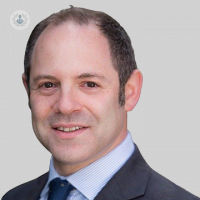An expert guide: How to prepare for complex abdominal wall reconstruction surgery
Written by:Surgery to repair the abdominal wall for a complex hernia involves an intricate procedure which can take several hours to perform. In order to lower the risk of infection or other complications from the operation, it is essential to prepare well for surgery by following expert medical advice. In this detailed article, highly respected consultant general, colorectal and emergency surgeon Mr Colin Hart shares his invaluable advice for patients preparing for their procedure and explains when complex abdominal wall repair surgery is required.

When is complex abdominal wall reconstruction necessary?
I see a large number of patients who have had one or more long incisions through the abdominal wall and sometimes these operations can be complicated by infections or are performed to treat existing infections. Following procedures of this type, a number of factors can cause the wall of the abdomen to give way and split through the prior surgical wound. These factors include:
- the patient’s physical state, including weight, chronic illnesses such as asthma
- poor nutrition
- any drugs they take
- the nature of the surgery and whether it was an emergency
- any contamination or post-operative issues such as infections or dehiscence, where the abdominal wall repair gives way
- repeated incisions in the same place
When this occurs, patients may develop a very large bulge which can contain any number of organs or simply fat, depending on how large the patient is. These massive hernias are mechanically quite restrictive for patients and may cause them physical issues. One patient of mine reported that every time she walked up the stairs, she would feel her bowel bouncing on her thighs which, naturally, she found very disconcerting. Patients are unable to lift heavy weights and perform other activities, bear down to go to the toilet and sometimes describe back pain or tenderness around the defect.
When the defect is relatively small in size but has a large amount of organs passing through it, particularly the bowel, this can cause symptoms of pain and tenderness and can be of more concern than a larger defect. When bowel becomes caught in the hernia, a patient may experience obstruction which leads patients to experience nausea, vomiting and bloating. It also prevents patients from opening their bowels or pass wind and causes them to feel generally very unwell.
How should patients prepare for complex abdominal wall reconstruction surgery?
Complex abdominal wall reconstruction procedures can be lengthy and may take anywhere from two to six hours to complete. Surgery of this type is no small thing to go through and therefore, to ensure that patients are as safe as possible in the procedure, it’s important that they go through a pre-operative assessment clinic, which should pick up any potential issues.
One area in particular that we know encourages the longevity of the repair and helps to prevent the problem from recurring is maintaining a healthy weight. Not only does a lower body weight make completing the procedure significantly easier, the risk of complications is also reduced and the rate of recurrence is much lower if the patient’s BMI is 30 or lower, for instance. We often refer patients to a bariatric service so that we can address excessive weight before doing our repairs.
Another key area of preparation relates to smoking and vaping. If patients smoke or vape, they should stop at least six weeks before the procedure to lower their risk of complications. Smoking increases the likelihood of infections to the wound, which in turn can cause a repair to fail.
If patients are diabetic, we try and optimise their control of the condition as this can affect the repair itself and can also make infection more likely. In fact, for all patients going through this type of surgery, infection is one of our key areas of concern. This is because in some cases, a further operation to remove a mesh is required should it become infected. The patient would then need further treatment with antibiotics before we try to repair the hernia again in a slightly different way.
Infection complicates things quite significantly and therefore it’s in everybody’s interest, including both the patient and surgeon, to minimise the risk and agree that weight loss, diabetic control and smoking are all addressed.
How is complex abdominal wall reconstruction performed? Is mesh always used?
An abdominal wall reconstruction is always performed under a general anaesthetic. As I mentioned, it is a very long procedure and therefore our anaesthetists give things like muscle relaxant and paralysis so patients are completely still and asleep with relaxed muscles during the procedure so that we are able to perform the reconstruction.
We normally approach the hernia through a previous incision and sometimes tidy up the old incision and excise its scar. The specifics of the procedure vary from patient to patient according to the complexity and grade of their hernia. As some hernias are larger than others, the time it takes to complete the procedure can vary between just a few hours to around six hours.
Generally speaking, surgery of this type typically involves forming a pocket within the deep layers of a patient’s abdominal wall and packaging away a mesh into that space. This is then closed over the top and usually some sort of release to allow that closure is required to fully cover the mesh. I always use a mesh because all the published evidence shows using a mesh reduces the risk of recurrence by around fifty per cent. One of the surgeon’s responsibilities is to select the most appropriate mesh for each patient. There is a wide variety available on the market and generally, I prefer to use a synthetic mesh because it lasts longer and is easy to use and trim. However I also favour a mesh with both synthetic and biological components if this is indicated.
What can patients expect during their post-operative recovery?
Patients usually spend a week or two in hospital recovering, depending on the size of their repair. Often I plan with the patient a post-operative stay in a High Dependency Ward for the first part of their post-operative recovery, this helps with monitoring after such a large operation and helps us deliver better pain relief. Patients often have a tube to drain the stomach inserted via a nostril, whilst they are still asleep in theatre. This helps avoid bloating, vomiting, nausea or abdominal discomfort.
Patients usually have drains fitted towards the end of surgery to help drain away excess fluid which may become infected. Daily blood tests are performed to keep an eye out for any signs of infection. I advise patients undergoing this type of surgery to wear a surgical binder for as much of the day as possible, for at least three months following the procedure.
Mr Colin Hart is a renowned general, colorectal and emergency consultant surgeon. If you require complex abdominal wall repair surgery and wish to discuss your individual case with Mr Hart, you can schedule a consultation with him by visiting his Top Doctors profile.


